Business Law Report: UK Parliament Sovereignty and Business Law
VerifiedAdded on 2020/12/10
|15
|5311
|439
Report
AI Summary
This business law report delves into the sovereignty of the UK Parliament, exploring its significance and the sources of law within the United Kingdom, including Acts of Parliament, delegated legislation, common law, and equity. It examines the role of the government in law-making, the application of statutory and common law in justice courts, and the impact of various laws on business organizations, such as employment and contract law. The report further investigates the nature and formation of different business types, differentiating between incorporated and unincorporated businesses, and analyzing the advantages and disadvantages of partnerships and companies. The second section provides legal advice and solutions for given commercial issues, along with alternative solutions, comparing the effectiveness of legal and alternative approaches in resolving disputes. The report concludes by summarizing the key findings and recommendations.
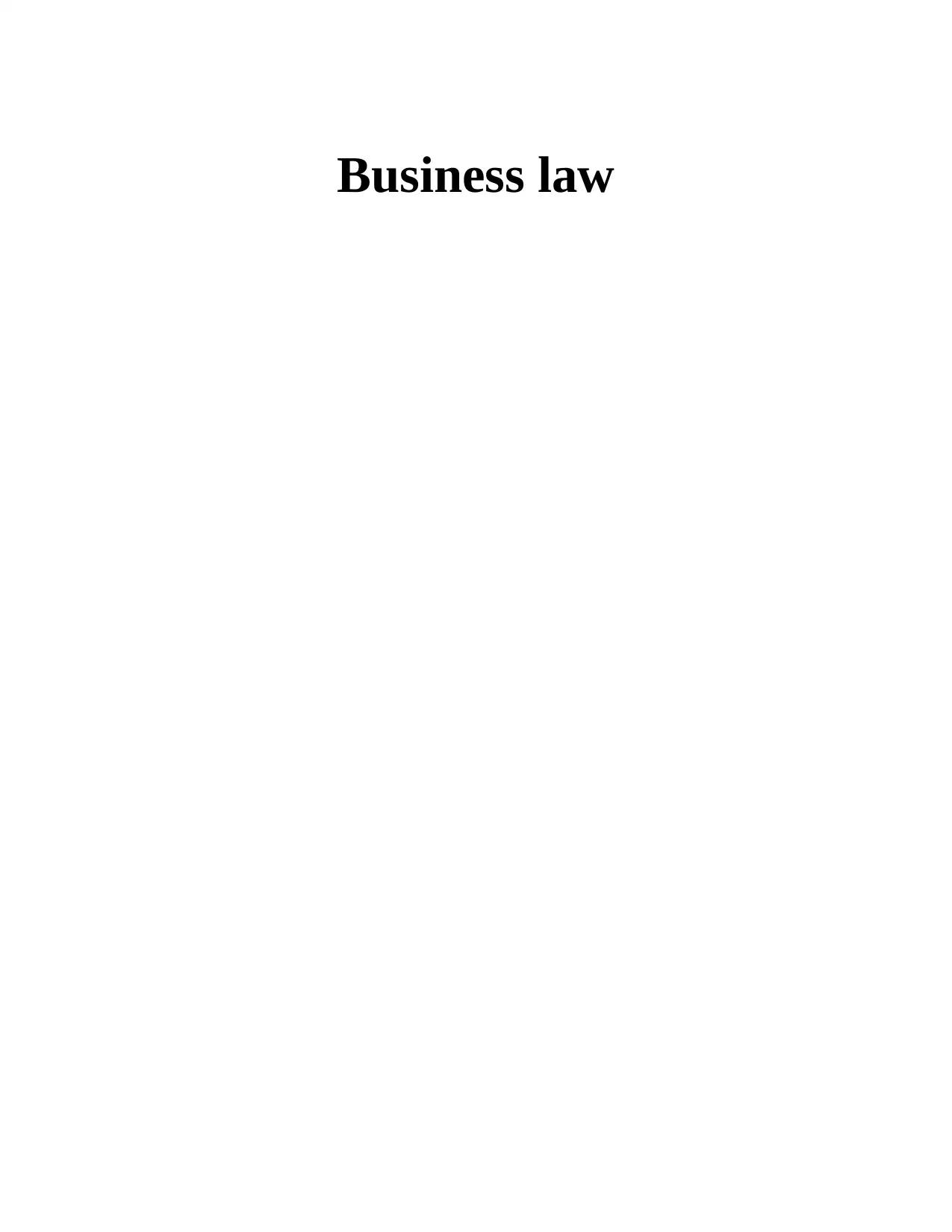
Business law
Paraphrase This Document
Need a fresh take? Get an instant paraphrase of this document with our AI Paraphraser
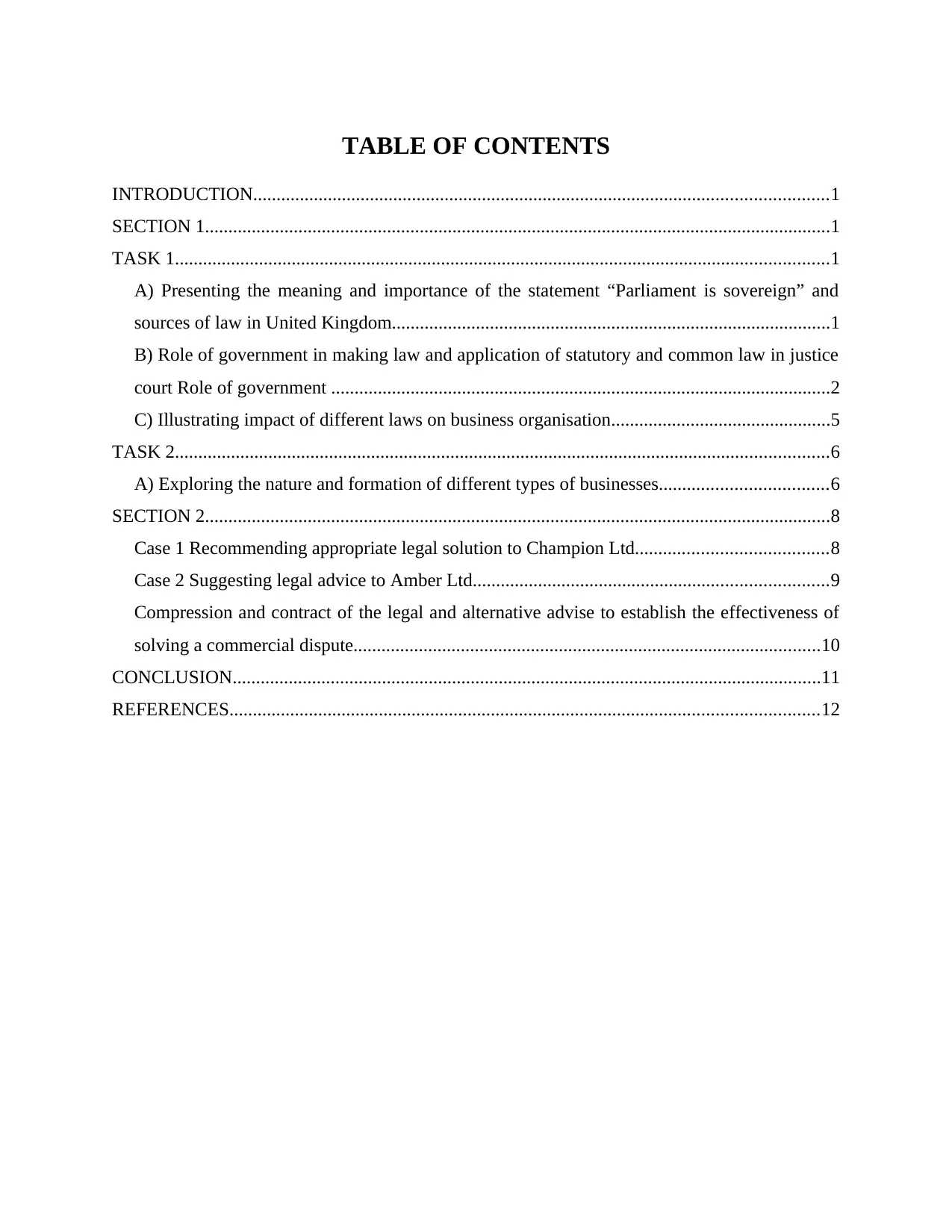
TABLE OF CONTENTS
INTRODUCTION...........................................................................................................................1
SECTION 1......................................................................................................................................1
TASK 1............................................................................................................................................1
A) Presenting the meaning and importance of the statement “Parliament is sovereign” and
sources of law in United Kingdom..............................................................................................1
B) Role of government in making law and application of statutory and common law in justice
court Role of government ...........................................................................................................2
C) Illustrating impact of different laws on business organisation...............................................5
TASK 2............................................................................................................................................6
A) Exploring the nature and formation of different types of businesses....................................6
SECTION 2......................................................................................................................................8
Case 1 Recommending appropriate legal solution to Champion Ltd.........................................8
Case 2 Suggesting legal advice to Amber Ltd............................................................................9
Compression and contract of the legal and alternative advise to establish the effectiveness of
solving a commercial dispute....................................................................................................10
CONCLUSION..............................................................................................................................11
REFERENCES..............................................................................................................................12
INTRODUCTION...........................................................................................................................1
SECTION 1......................................................................................................................................1
TASK 1............................................................................................................................................1
A) Presenting the meaning and importance of the statement “Parliament is sovereign” and
sources of law in United Kingdom..............................................................................................1
B) Role of government in making law and application of statutory and common law in justice
court Role of government ...........................................................................................................2
C) Illustrating impact of different laws on business organisation...............................................5
TASK 2............................................................................................................................................6
A) Exploring the nature and formation of different types of businesses....................................6
SECTION 2......................................................................................................................................8
Case 1 Recommending appropriate legal solution to Champion Ltd.........................................8
Case 2 Suggesting legal advice to Amber Ltd............................................................................9
Compression and contract of the legal and alternative advise to establish the effectiveness of
solving a commercial dispute....................................................................................................10
CONCLUSION..............................................................................................................................11
REFERENCES..............................................................................................................................12
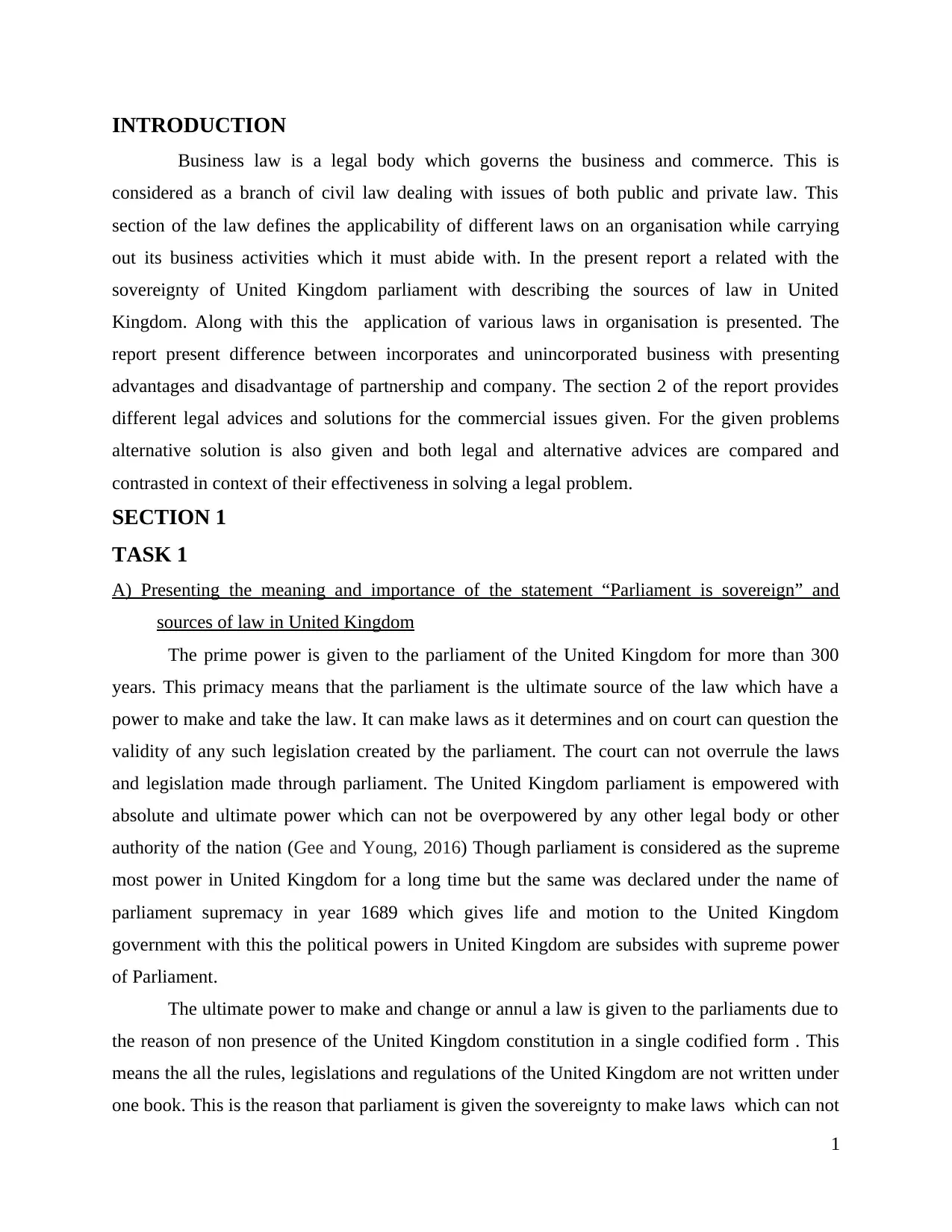
INTRODUCTION
Business law is a legal body which governs the business and commerce. This is
considered as a branch of civil law dealing with issues of both public and private law. This
section of the law defines the applicability of different laws on an organisation while carrying
out its business activities which it must abide with. In the present report a related with the
sovereignty of United Kingdom parliament with describing the sources of law in United
Kingdom. Along with this the application of various laws in organisation is presented. The
report present difference between incorporates and unincorporated business with presenting
advantages and disadvantage of partnership and company. The section 2 of the report provides
different legal advices and solutions for the commercial issues given. For the given problems
alternative solution is also given and both legal and alternative advices are compared and
contrasted in context of their effectiveness in solving a legal problem.
SECTION 1
TASK 1
A) Presenting the meaning and importance of the statement “Parliament is sovereign” and
sources of law in United Kingdom
The prime power is given to the parliament of the United Kingdom for more than 300
years. This primacy means that the parliament is the ultimate source of the law which have a
power to make and take the law. It can make laws as it determines and on court can question the
validity of any such legislation created by the parliament. The court can not overrule the laws
and legislation made through parliament. The United Kingdom parliament is empowered with
absolute and ultimate power which can not be overpowered by any other legal body or other
authority of the nation (Gee and Young, 2016) Though parliament is considered as the supreme
most power in United Kingdom for a long time but the same was declared under the name of
parliament supremacy in year 1689 which gives life and motion to the United Kingdom
government with this the political powers in United Kingdom are subsides with supreme power
of Parliament.
The ultimate power to make and change or annul a law is given to the parliaments due to
the reason of non presence of the United Kingdom constitution in a single codified form . This
means the all the rules, legislations and regulations of the United Kingdom are not written under
one book. This is the reason that parliament is given the sovereignty to make laws which can not
1
Business law is a legal body which governs the business and commerce. This is
considered as a branch of civil law dealing with issues of both public and private law. This
section of the law defines the applicability of different laws on an organisation while carrying
out its business activities which it must abide with. In the present report a related with the
sovereignty of United Kingdom parliament with describing the sources of law in United
Kingdom. Along with this the application of various laws in organisation is presented. The
report present difference between incorporates and unincorporated business with presenting
advantages and disadvantage of partnership and company. The section 2 of the report provides
different legal advices and solutions for the commercial issues given. For the given problems
alternative solution is also given and both legal and alternative advices are compared and
contrasted in context of their effectiveness in solving a legal problem.
SECTION 1
TASK 1
A) Presenting the meaning and importance of the statement “Parliament is sovereign” and
sources of law in United Kingdom
The prime power is given to the parliament of the United Kingdom for more than 300
years. This primacy means that the parliament is the ultimate source of the law which have a
power to make and take the law. It can make laws as it determines and on court can question the
validity of any such legislation created by the parliament. The court can not overrule the laws
and legislation made through parliament. The United Kingdom parliament is empowered with
absolute and ultimate power which can not be overpowered by any other legal body or other
authority of the nation (Gee and Young, 2016) Though parliament is considered as the supreme
most power in United Kingdom for a long time but the same was declared under the name of
parliament supremacy in year 1689 which gives life and motion to the United Kingdom
government with this the political powers in United Kingdom are subsides with supreme power
of Parliament.
The ultimate power to make and change or annul a law is given to the parliaments due to
the reason of non presence of the United Kingdom constitution in a single codified form . This
means the all the rules, legislations and regulations of the United Kingdom are not written under
one book. This is the reason that parliament is given the sovereignty to make laws which can not
1
⊘ This is a preview!⊘
Do you want full access?
Subscribe today to unlock all pages.

Trusted by 1+ million students worldwide
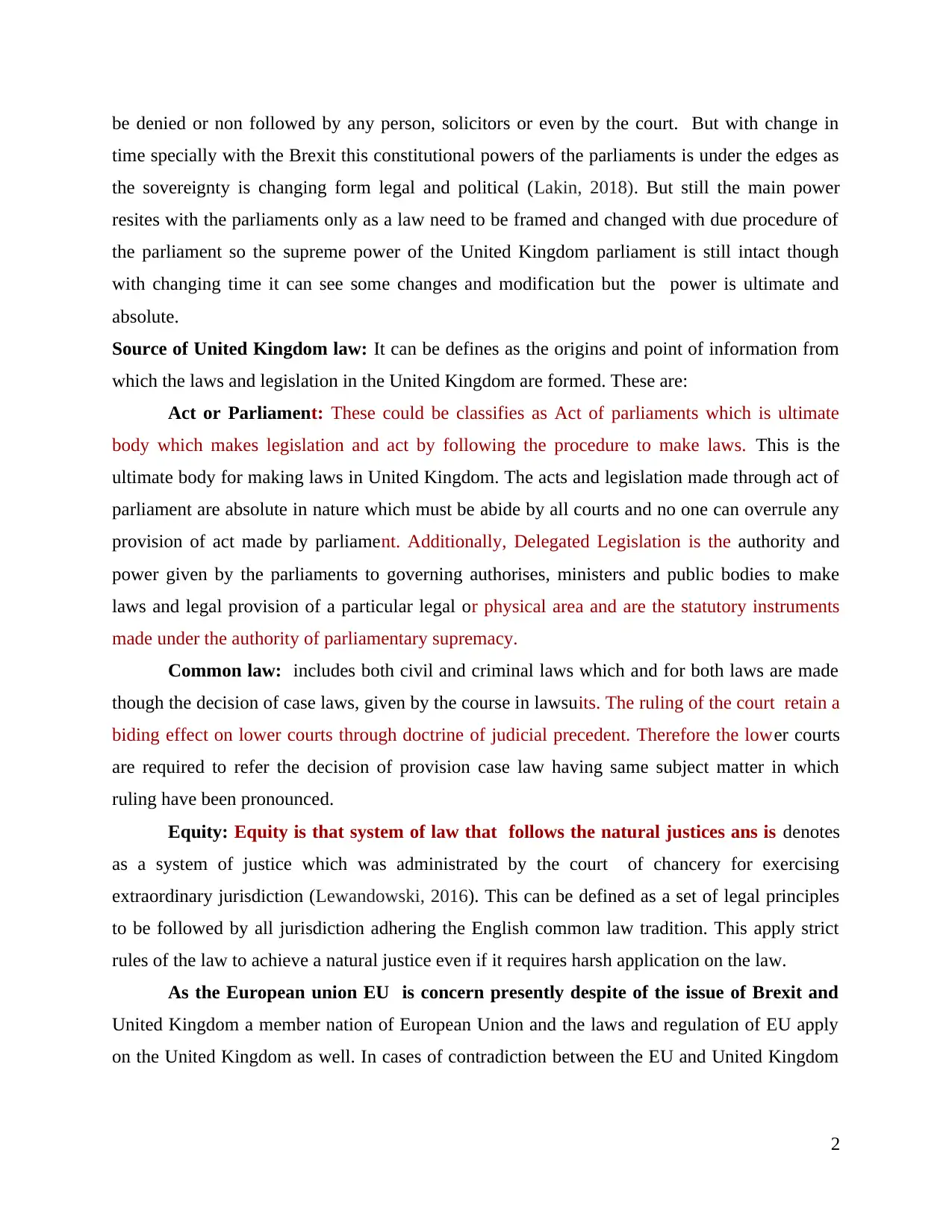
be denied or non followed by any person, solicitors or even by the court. But with change in
time specially with the Brexit this constitutional powers of the parliaments is under the edges as
the sovereignty is changing form legal and political (Lakin, 2018). But still the main power
resites with the parliaments only as a law need to be framed and changed with due procedure of
the parliament so the supreme power of the United Kingdom parliament is still intact though
with changing time it can see some changes and modification but the power is ultimate and
absolute.
Source of United Kingdom law: It can be defines as the origins and point of information from
which the laws and legislation in the United Kingdom are formed. These are:
Act or Parliament: These could be classifies as Act of parliaments which is ultimate
body which makes legislation and act by following the procedure to make laws. This is the
ultimate body for making laws in United Kingdom. The acts and legislation made through act of
parliament are absolute in nature which must be abide by all courts and no one can overrule any
provision of act made by parliament. Additionally, Delegated Legislation is the authority and
power given by the parliaments to governing authorises, ministers and public bodies to make
laws and legal provision of a particular legal or physical area and are the statutory instruments
made under the authority of parliamentary supremacy.
Common law: includes both civil and criminal laws which and for both laws are made
though the decision of case laws, given by the course in lawsuits. The ruling of the court retain a
biding effect on lower courts through doctrine of judicial precedent. Therefore the lower courts
are required to refer the decision of provision case law having same subject matter in which
ruling have been pronounced.
Equity: Equity is that system of law that follows the natural justices ans is denotes
as a system of justice which was administrated by the court of chancery for exercising
extraordinary jurisdiction (Lewandowski, 2016). This can be defined as a set of legal principles
to be followed by all jurisdiction adhering the English common law tradition. This apply strict
rules of the law to achieve a natural justice even if it requires harsh application on the law.
As the European union EU is concern presently despite of the issue of Brexit and
United Kingdom a member nation of European Union and the laws and regulation of EU apply
on the United Kingdom as well. In cases of contradiction between the EU and United Kingdom
2
time specially with the Brexit this constitutional powers of the parliaments is under the edges as
the sovereignty is changing form legal and political (Lakin, 2018). But still the main power
resites with the parliaments only as a law need to be framed and changed with due procedure of
the parliament so the supreme power of the United Kingdom parliament is still intact though
with changing time it can see some changes and modification but the power is ultimate and
absolute.
Source of United Kingdom law: It can be defines as the origins and point of information from
which the laws and legislation in the United Kingdom are formed. These are:
Act or Parliament: These could be classifies as Act of parliaments which is ultimate
body which makes legislation and act by following the procedure to make laws. This is the
ultimate body for making laws in United Kingdom. The acts and legislation made through act of
parliament are absolute in nature which must be abide by all courts and no one can overrule any
provision of act made by parliament. Additionally, Delegated Legislation is the authority and
power given by the parliaments to governing authorises, ministers and public bodies to make
laws and legal provision of a particular legal or physical area and are the statutory instruments
made under the authority of parliamentary supremacy.
Common law: includes both civil and criminal laws which and for both laws are made
though the decision of case laws, given by the course in lawsuits. The ruling of the court retain a
biding effect on lower courts through doctrine of judicial precedent. Therefore the lower courts
are required to refer the decision of provision case law having same subject matter in which
ruling have been pronounced.
Equity: Equity is that system of law that follows the natural justices ans is denotes
as a system of justice which was administrated by the court of chancery for exercising
extraordinary jurisdiction (Lewandowski, 2016). This can be defined as a set of legal principles
to be followed by all jurisdiction adhering the English common law tradition. This apply strict
rules of the law to achieve a natural justice even if it requires harsh application on the law.
As the European union EU is concern presently despite of the issue of Brexit and
United Kingdom a member nation of European Union and the laws and regulation of EU apply
on the United Kingdom as well. In cases of contradiction between the EU and United Kingdom
2
Paraphrase This Document
Need a fresh take? Get an instant paraphrase of this document with our AI Paraphraser
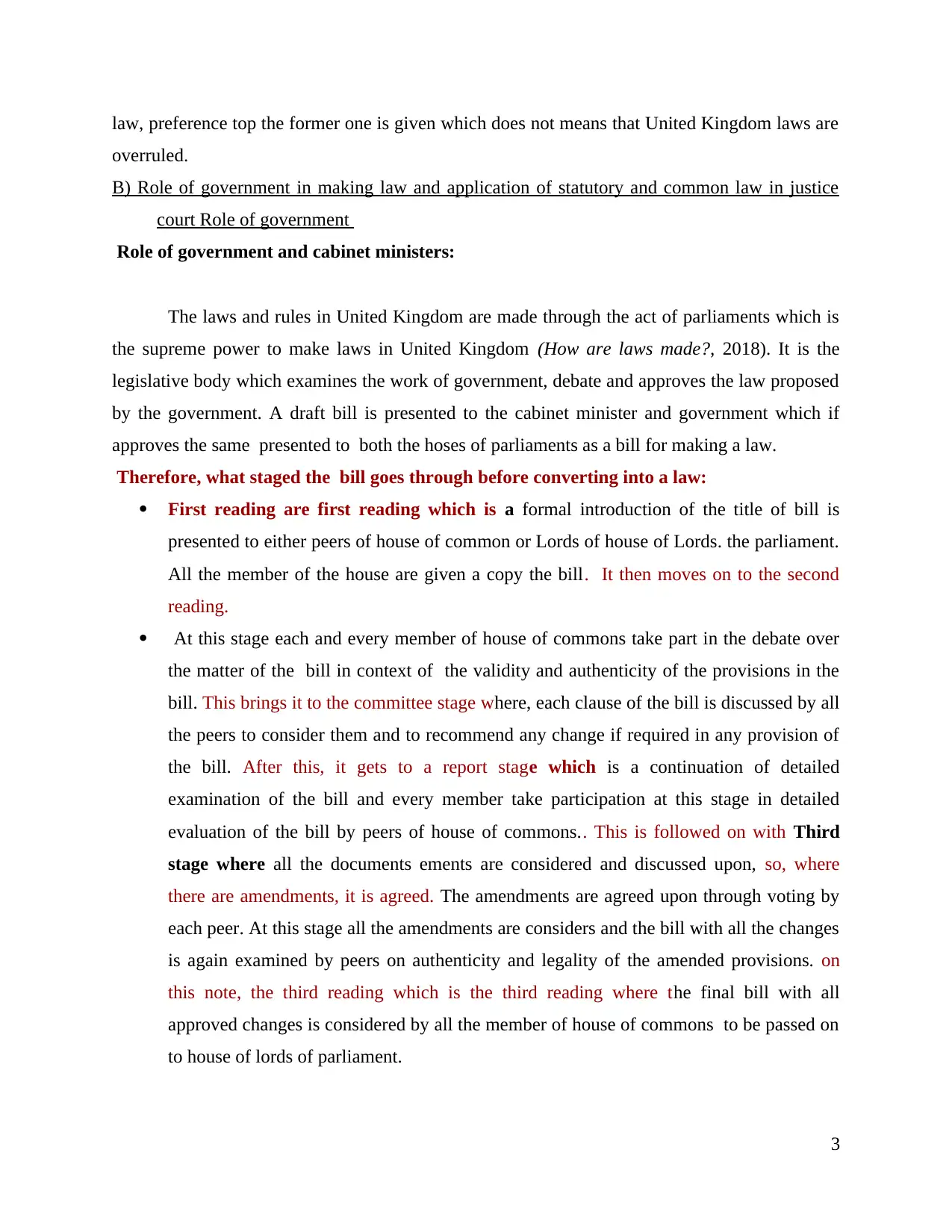
law, preference top the former one is given which does not means that United Kingdom laws are
overruled.
B) Role of government in making law and application of statutory and common law in justice
court Role of government
Role of government and cabinet ministers:
The laws and rules in United Kingdom are made through the act of parliaments which is
the supreme power to make laws in United Kingdom (How are laws made?, 2018). It is the
legislative body which examines the work of government, debate and approves the law proposed
by the government. A draft bill is presented to the cabinet minister and government which if
approves the same presented to both the hoses of parliaments as a bill for making a law.
Therefore, what staged the bill goes through before converting into a law:
First reading are first reading which is a formal introduction of the title of bill is
presented to either peers of house of common or Lords of house of Lords. the parliament.
All the member of the house are given a copy the bill. It then moves on to the second
reading.
At this stage each and every member of house of commons take part in the debate over
the matter of the bill in context of the validity and authenticity of the provisions in the
bill. This brings it to the committee stage where, each clause of the bill is discussed by all
the peers to consider them and to recommend any change if required in any provision of
the bill. After this, it gets to a report stage which is a continuation of detailed
examination of the bill and every member take participation at this stage in detailed
evaluation of the bill by peers of house of commons.. This is followed on with Third
stage where all the documents ements are considered and discussed upon, so, where
there are amendments, it is agreed. The amendments are agreed upon through voting by
each peer. At this stage all the amendments are considers and the bill with all the changes
is again examined by peers on authenticity and legality of the amended provisions. on
this note, the third reading which is the third reading where the final bill with all
approved changes is considered by all the member of house of commons to be passed on
to house of lords of parliament.
3
overruled.
B) Role of government in making law and application of statutory and common law in justice
court Role of government
Role of government and cabinet ministers:
The laws and rules in United Kingdom are made through the act of parliaments which is
the supreme power to make laws in United Kingdom (How are laws made?, 2018). It is the
legislative body which examines the work of government, debate and approves the law proposed
by the government. A draft bill is presented to the cabinet minister and government which if
approves the same presented to both the hoses of parliaments as a bill for making a law.
Therefore, what staged the bill goes through before converting into a law:
First reading are first reading which is a formal introduction of the title of bill is
presented to either peers of house of common or Lords of house of Lords. the parliament.
All the member of the house are given a copy the bill. It then moves on to the second
reading.
At this stage each and every member of house of commons take part in the debate over
the matter of the bill in context of the validity and authenticity of the provisions in the
bill. This brings it to the committee stage where, each clause of the bill is discussed by all
the peers to consider them and to recommend any change if required in any provision of
the bill. After this, it gets to a report stage which is a continuation of detailed
examination of the bill and every member take participation at this stage in detailed
evaluation of the bill by peers of house of commons.. This is followed on with Third
stage where all the documents ements are considered and discussed upon, so, where
there are amendments, it is agreed. The amendments are agreed upon through voting by
each peer. At this stage all the amendments are considers and the bill with all the changes
is again examined by peers on authenticity and legality of the amended provisions. on
this note, the third reading which is the third reading where the final bill with all
approved changes is considered by all the member of house of commons to be passed on
to house of lords of parliament.
3
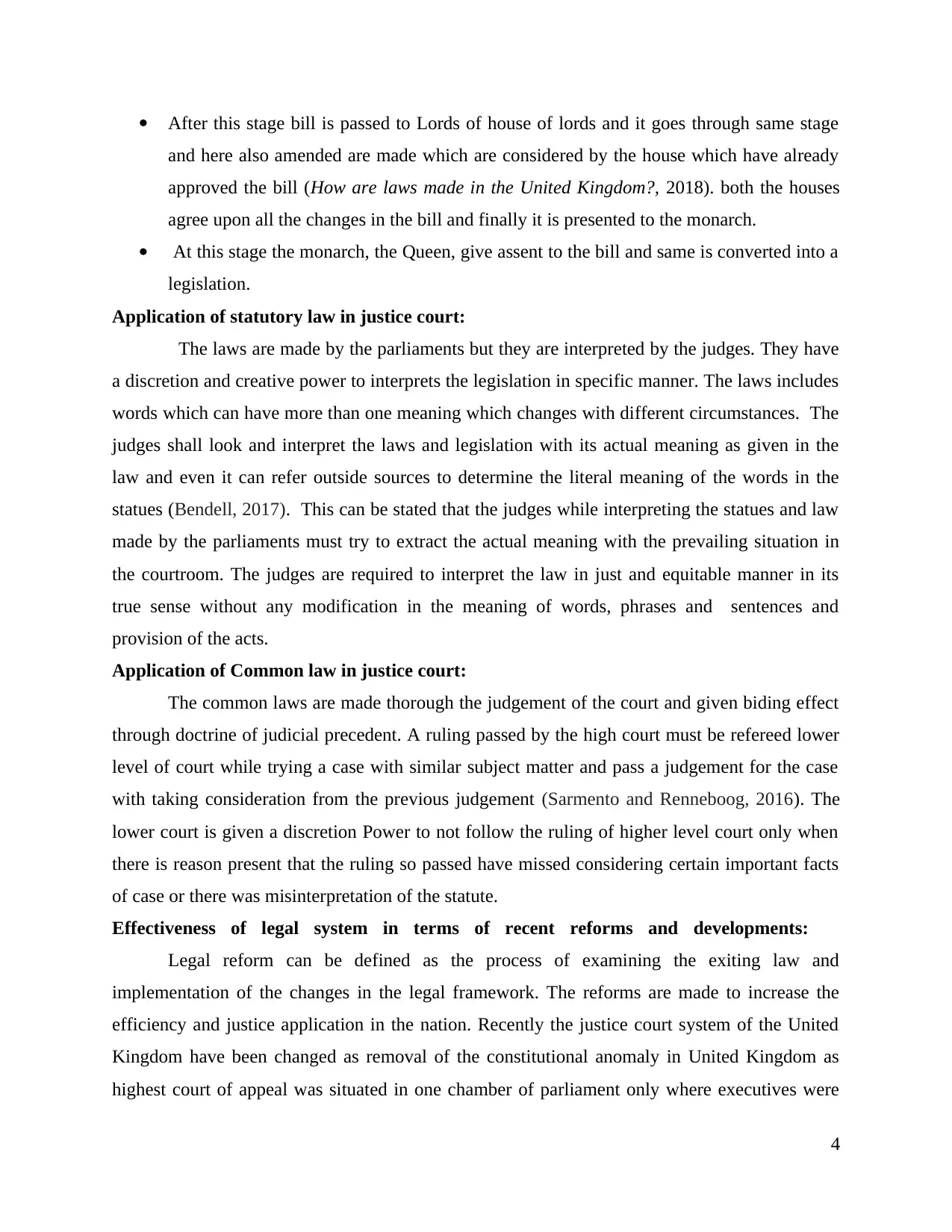
After this stage bill is passed to Lords of house of lords and it goes through same stage
and here also amended are made which are considered by the house which have already
approved the bill (How are laws made in the United Kingdom?, 2018). both the houses
agree upon all the changes in the bill and finally it is presented to the monarch.
At this stage the monarch, the Queen, give assent to the bill and same is converted into a
legislation.
Application of statutory law in justice court:
The laws are made by the parliaments but they are interpreted by the judges. They have
a discretion and creative power to interprets the legislation in specific manner. The laws includes
words which can have more than one meaning which changes with different circumstances. The
judges shall look and interpret the laws and legislation with its actual meaning as given in the
law and even it can refer outside sources to determine the literal meaning of the words in the
statues (Bendell, 2017). This can be stated that the judges while interpreting the statues and law
made by the parliaments must try to extract the actual meaning with the prevailing situation in
the courtroom. The judges are required to interpret the law in just and equitable manner in its
true sense without any modification in the meaning of words, phrases and sentences and
provision of the acts.
Application of Common law in justice court:
The common laws are made thorough the judgement of the court and given biding effect
through doctrine of judicial precedent. A ruling passed by the high court must be refereed lower
level of court while trying a case with similar subject matter and pass a judgement for the case
with taking consideration from the previous judgement (Sarmento and Renneboog, 2016). The
lower court is given a discretion Power to not follow the ruling of higher level court only when
there is reason present that the ruling so passed have missed considering certain important facts
of case or there was misinterpretation of the statute.
Effectiveness of legal system in terms of recent reforms and developments:
Legal reform can be defined as the process of examining the exiting law and
implementation of the changes in the legal framework. The reforms are made to increase the
efficiency and justice application in the nation. Recently the justice court system of the United
Kingdom have been changed as removal of the constitutional anomaly in United Kingdom as
highest court of appeal was situated in one chamber of parliament only where executives were
4
and here also amended are made which are considered by the house which have already
approved the bill (How are laws made in the United Kingdom?, 2018). both the houses
agree upon all the changes in the bill and finally it is presented to the monarch.
At this stage the monarch, the Queen, give assent to the bill and same is converted into a
legislation.
Application of statutory law in justice court:
The laws are made by the parliaments but they are interpreted by the judges. They have
a discretion and creative power to interprets the legislation in specific manner. The laws includes
words which can have more than one meaning which changes with different circumstances. The
judges shall look and interpret the laws and legislation with its actual meaning as given in the
law and even it can refer outside sources to determine the literal meaning of the words in the
statues (Bendell, 2017). This can be stated that the judges while interpreting the statues and law
made by the parliaments must try to extract the actual meaning with the prevailing situation in
the courtroom. The judges are required to interpret the law in just and equitable manner in its
true sense without any modification in the meaning of words, phrases and sentences and
provision of the acts.
Application of Common law in justice court:
The common laws are made thorough the judgement of the court and given biding effect
through doctrine of judicial precedent. A ruling passed by the high court must be refereed lower
level of court while trying a case with similar subject matter and pass a judgement for the case
with taking consideration from the previous judgement (Sarmento and Renneboog, 2016). The
lower court is given a discretion Power to not follow the ruling of higher level court only when
there is reason present that the ruling so passed have missed considering certain important facts
of case or there was misinterpretation of the statute.
Effectiveness of legal system in terms of recent reforms and developments:
Legal reform can be defined as the process of examining the exiting law and
implementation of the changes in the legal framework. The reforms are made to increase the
efficiency and justice application in the nation. Recently the justice court system of the United
Kingdom have been changed as removal of the constitutional anomaly in United Kingdom as
highest court of appeal was situated in one chamber of parliament only where executives were
4
⊘ This is a preview!⊘
Do you want full access?
Subscribe today to unlock all pages.

Trusted by 1+ million students worldwide
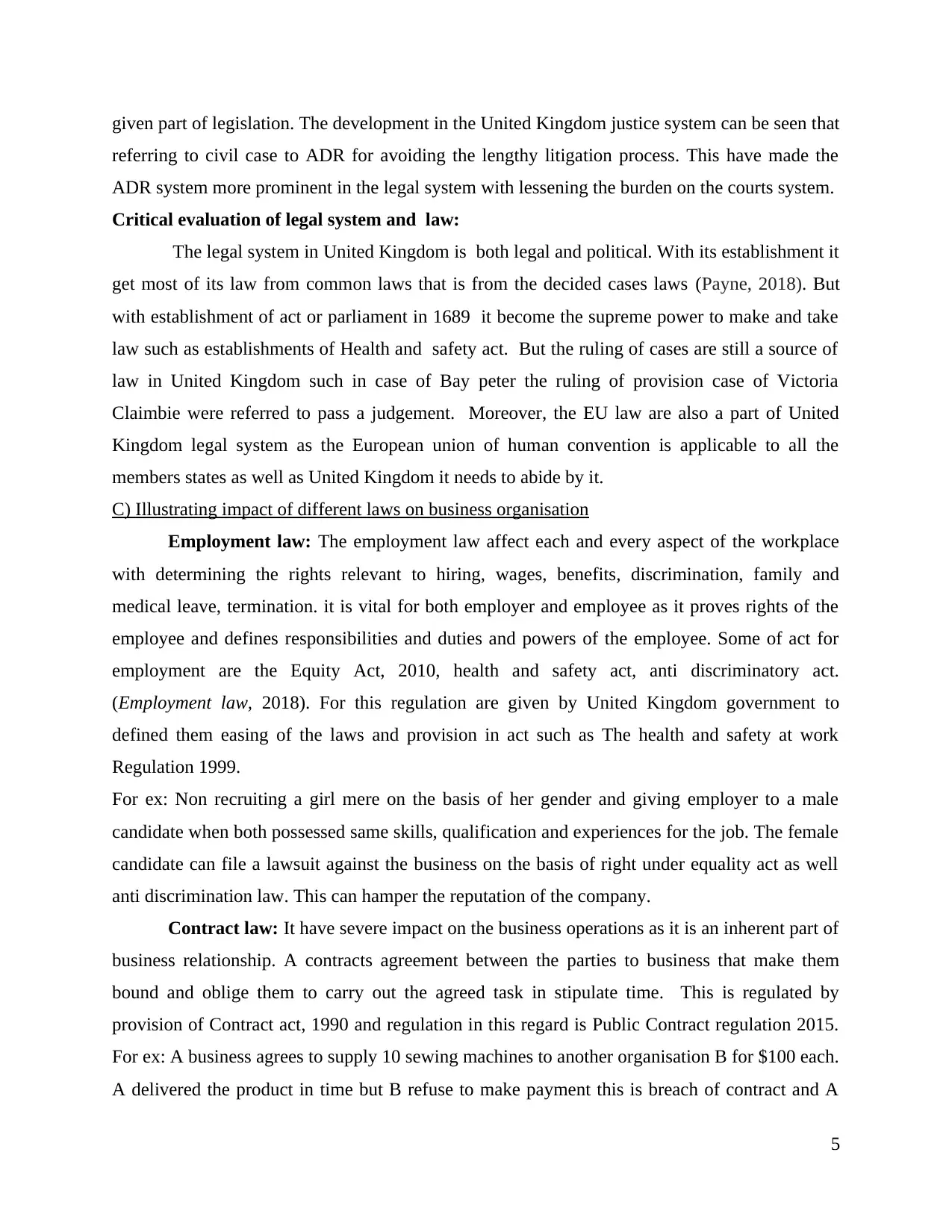
given part of legislation. The development in the United Kingdom justice system can be seen that
referring to civil case to ADR for avoiding the lengthy litigation process. This have made the
ADR system more prominent in the legal system with lessening the burden on the courts system.
Critical evaluation of legal system and law:
The legal system in United Kingdom is both legal and political. With its establishment it
get most of its law from common laws that is from the decided cases laws (Payne, 2018). But
with establishment of act or parliament in 1689 it become the supreme power to make and take
law such as establishments of Health and safety act. But the ruling of cases are still a source of
law in United Kingdom such in case of Bay peter the ruling of provision case of Victoria
Claimbie were referred to pass a judgement. Moreover, the EU law are also a part of United
Kingdom legal system as the European union of human convention is applicable to all the
members states as well as United Kingdom it needs to abide by it.
C) Illustrating impact of different laws on business organisation
Employment law: The employment law affect each and every aspect of the workplace
with determining the rights relevant to hiring, wages, benefits, discrimination, family and
medical leave, termination. it is vital for both employer and employee as it proves rights of the
employee and defines responsibilities and duties and powers of the employee. Some of act for
employment are the Equity Act, 2010, health and safety act, anti discriminatory act.
(Employment law, 2018). For this regulation are given by United Kingdom government to
defined them easing of the laws and provision in act such as The health and safety at work
Regulation 1999.
For ex: Non recruiting a girl mere on the basis of her gender and giving employer to a male
candidate when both possessed same skills, qualification and experiences for the job. The female
candidate can file a lawsuit against the business on the basis of right under equality act as well
anti discrimination law. This can hamper the reputation of the company.
Contract law: It have severe impact on the business operations as it is an inherent part of
business relationship. A contracts agreement between the parties to business that make them
bound and oblige them to carry out the agreed task in stipulate time. This is regulated by
provision of Contract act, 1990 and regulation in this regard is Public Contract regulation 2015.
For ex: A business agrees to supply 10 sewing machines to another organisation B for $100 each.
A delivered the product in time but B refuse to make payment this is breach of contract and A
5
referring to civil case to ADR for avoiding the lengthy litigation process. This have made the
ADR system more prominent in the legal system with lessening the burden on the courts system.
Critical evaluation of legal system and law:
The legal system in United Kingdom is both legal and political. With its establishment it
get most of its law from common laws that is from the decided cases laws (Payne, 2018). But
with establishment of act or parliament in 1689 it become the supreme power to make and take
law such as establishments of Health and safety act. But the ruling of cases are still a source of
law in United Kingdom such in case of Bay peter the ruling of provision case of Victoria
Claimbie were referred to pass a judgement. Moreover, the EU law are also a part of United
Kingdom legal system as the European union of human convention is applicable to all the
members states as well as United Kingdom it needs to abide by it.
C) Illustrating impact of different laws on business organisation
Employment law: The employment law affect each and every aspect of the workplace
with determining the rights relevant to hiring, wages, benefits, discrimination, family and
medical leave, termination. it is vital for both employer and employee as it proves rights of the
employee and defines responsibilities and duties and powers of the employee. Some of act for
employment are the Equity Act, 2010, health and safety act, anti discriminatory act.
(Employment law, 2018). For this regulation are given by United Kingdom government to
defined them easing of the laws and provision in act such as The health and safety at work
Regulation 1999.
For ex: Non recruiting a girl mere on the basis of her gender and giving employer to a male
candidate when both possessed same skills, qualification and experiences for the job. The female
candidate can file a lawsuit against the business on the basis of right under equality act as well
anti discrimination law. This can hamper the reputation of the company.
Contract law: It have severe impact on the business operations as it is an inherent part of
business relationship. A contracts agreement between the parties to business that make them
bound and oblige them to carry out the agreed task in stipulate time. This is regulated by
provision of Contract act, 1990 and regulation in this regard is Public Contract regulation 2015.
For ex: A business agrees to supply 10 sewing machines to another organisation B for $100 each.
A delivered the product in time but B refuse to make payment this is breach of contract and A
5
Paraphrase This Document
Need a fresh take? Get an instant paraphrase of this document with our AI Paraphraser
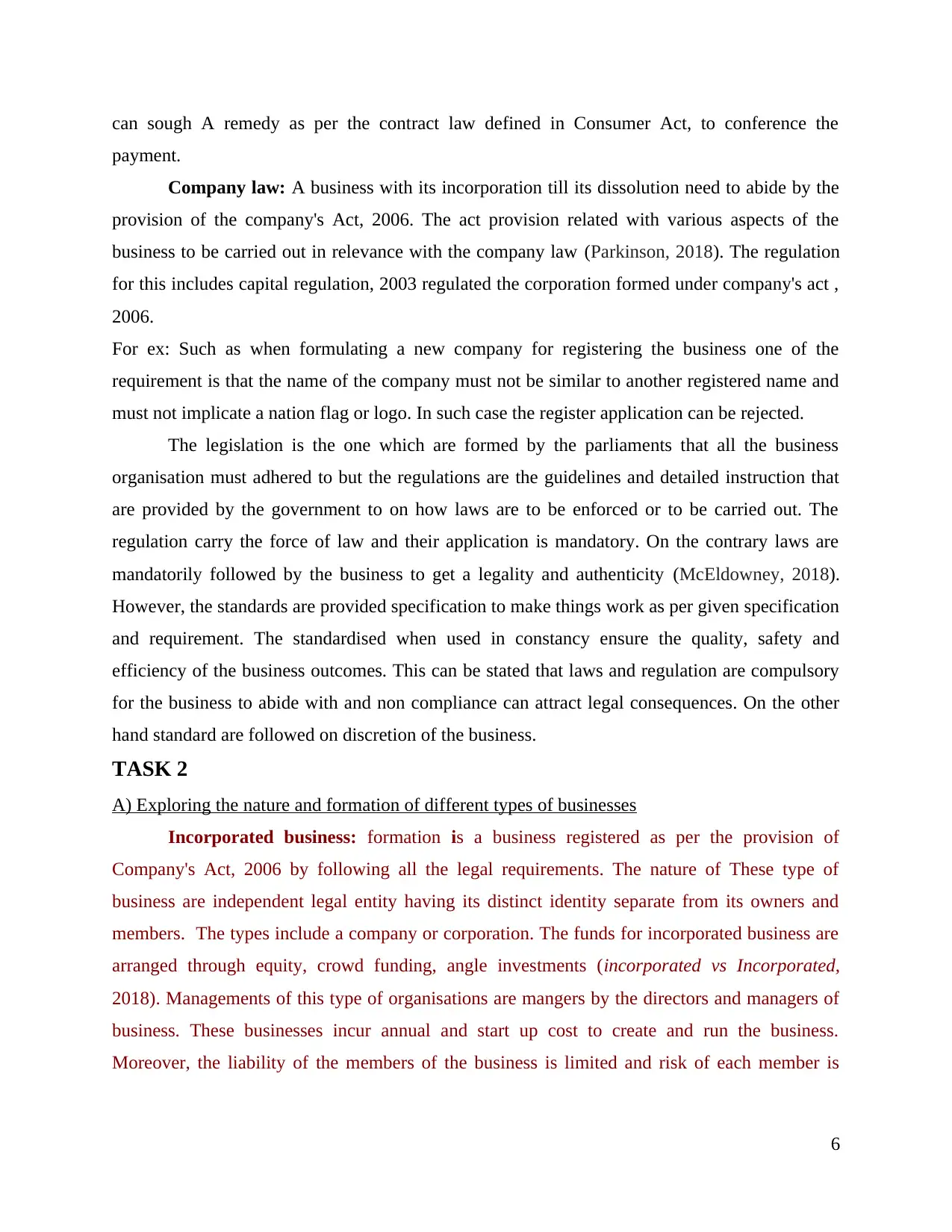
can sough A remedy as per the contract law defined in Consumer Act, to conference the
payment.
Company law: A business with its incorporation till its dissolution need to abide by the
provision of the company's Act, 2006. The act provision related with various aspects of the
business to be carried out in relevance with the company law (Parkinson, 2018). The regulation
for this includes capital regulation, 2003 regulated the corporation formed under company's act ,
2006.
For ex: Such as when formulating a new company for registering the business one of the
requirement is that the name of the company must not be similar to another registered name and
must not implicate a nation flag or logo. In such case the register application can be rejected.
The legislation is the one which are formed by the parliaments that all the business
organisation must adhered to but the regulations are the guidelines and detailed instruction that
are provided by the government to on how laws are to be enforced or to be carried out. The
regulation carry the force of law and their application is mandatory. On the contrary laws are
mandatorily followed by the business to get a legality and authenticity (McEldowney, 2018).
However, the standards are provided specification to make things work as per given specification
and requirement. The standardised when used in constancy ensure the quality, safety and
efficiency of the business outcomes. This can be stated that laws and regulation are compulsory
for the business to abide with and non compliance can attract legal consequences. On the other
hand standard are followed on discretion of the business.
TASK 2
A) Exploring the nature and formation of different types of businesses
Incorporated business: formation is a business registered as per the provision of
Company's Act, 2006 by following all the legal requirements. The nature of These type of
business are independent legal entity having its distinct identity separate from its owners and
members. The types include a company or corporation. The funds for incorporated business are
arranged through equity, crowd funding, angle investments (incorporated vs Incorporated,
2018). Managements of this type of organisations are mangers by the directors and managers of
business. These businesses incur annual and start up cost to create and run the business.
Moreover, the liability of the members of the business is limited and risk of each member is
6
payment.
Company law: A business with its incorporation till its dissolution need to abide by the
provision of the company's Act, 2006. The act provision related with various aspects of the
business to be carried out in relevance with the company law (Parkinson, 2018). The regulation
for this includes capital regulation, 2003 regulated the corporation formed under company's act ,
2006.
For ex: Such as when formulating a new company for registering the business one of the
requirement is that the name of the company must not be similar to another registered name and
must not implicate a nation flag or logo. In such case the register application can be rejected.
The legislation is the one which are formed by the parliaments that all the business
organisation must adhered to but the regulations are the guidelines and detailed instruction that
are provided by the government to on how laws are to be enforced or to be carried out. The
regulation carry the force of law and their application is mandatory. On the contrary laws are
mandatorily followed by the business to get a legality and authenticity (McEldowney, 2018).
However, the standards are provided specification to make things work as per given specification
and requirement. The standardised when used in constancy ensure the quality, safety and
efficiency of the business outcomes. This can be stated that laws and regulation are compulsory
for the business to abide with and non compliance can attract legal consequences. On the other
hand standard are followed on discretion of the business.
TASK 2
A) Exploring the nature and formation of different types of businesses
Incorporated business: formation is a business registered as per the provision of
Company's Act, 2006 by following all the legal requirements. The nature of These type of
business are independent legal entity having its distinct identity separate from its owners and
members. The types include a company or corporation. The funds for incorporated business are
arranged through equity, crowd funding, angle investments (incorporated vs Incorporated,
2018). Managements of this type of organisations are mangers by the directors and managers of
business. These businesses incur annual and start up cost to create and run the business.
Moreover, the liability of the members of the business is limited and risk of each member is
6
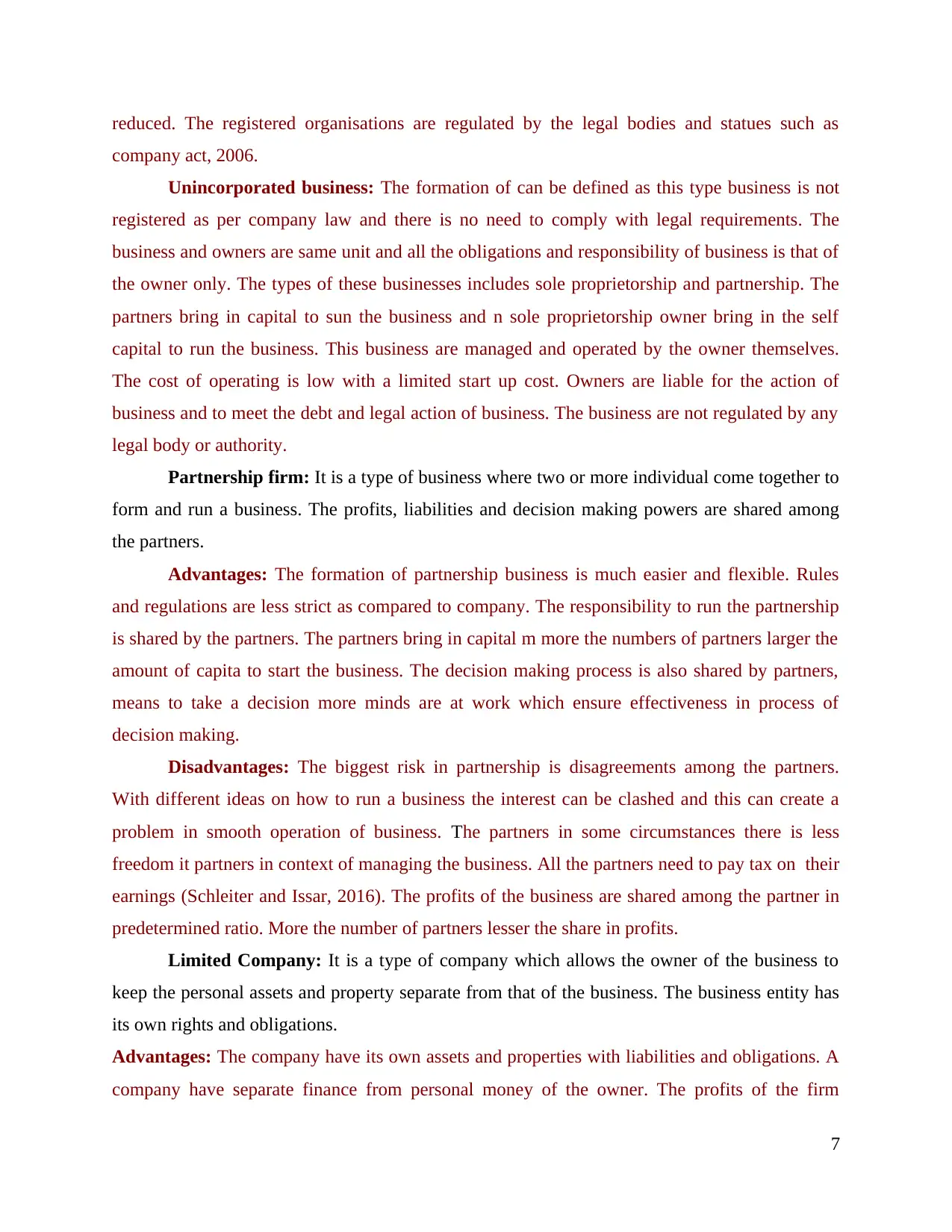
reduced. The registered organisations are regulated by the legal bodies and statues such as
company act, 2006.
Unincorporated business: The formation of can be defined as this type business is not
registered as per company law and there is no need to comply with legal requirements. The
business and owners are same unit and all the obligations and responsibility of business is that of
the owner only. The types of these businesses includes sole proprietorship and partnership. The
partners bring in capital to sun the business and n sole proprietorship owner bring in the self
capital to run the business. This business are managed and operated by the owner themselves.
The cost of operating is low with a limited start up cost. Owners are liable for the action of
business and to meet the debt and legal action of business. The business are not regulated by any
legal body or authority.
Partnership firm: It is a type of business where two or more individual come together to
form and run a business. The profits, liabilities and decision making powers are shared among
the partners.
Advantages: The formation of partnership business is much easier and flexible. Rules
and regulations are less strict as compared to company. The responsibility to run the partnership
is shared by the partners. The partners bring in capital m more the numbers of partners larger the
amount of capita to start the business. The decision making process is also shared by partners,
means to take a decision more minds are at work which ensure effectiveness in process of
decision making.
Disadvantages: The biggest risk in partnership is disagreements among the partners.
With different ideas on how to run a business the interest can be clashed and this can create a
problem in smooth operation of business. The partners in some circumstances there is less
freedom it partners in context of managing the business. All the partners need to pay tax on their
earnings (Schleiter and Issar, 2016). The profits of the business are shared among the partner in
predetermined ratio. More the number of partners lesser the share in profits.
Limited Company: It is a type of company which allows the owner of the business to
keep the personal assets and property separate from that of the business. The business entity has
its own rights and obligations.
Advantages: The company have its own assets and properties with liabilities and obligations. A
company have separate finance from personal money of the owner. The profits of the firm
7
company act, 2006.
Unincorporated business: The formation of can be defined as this type business is not
registered as per company law and there is no need to comply with legal requirements. The
business and owners are same unit and all the obligations and responsibility of business is that of
the owner only. The types of these businesses includes sole proprietorship and partnership. The
partners bring in capital to sun the business and n sole proprietorship owner bring in the self
capital to run the business. This business are managed and operated by the owner themselves.
The cost of operating is low with a limited start up cost. Owners are liable for the action of
business and to meet the debt and legal action of business. The business are not regulated by any
legal body or authority.
Partnership firm: It is a type of business where two or more individual come together to
form and run a business. The profits, liabilities and decision making powers are shared among
the partners.
Advantages: The formation of partnership business is much easier and flexible. Rules
and regulations are less strict as compared to company. The responsibility to run the partnership
is shared by the partners. The partners bring in capital m more the numbers of partners larger the
amount of capita to start the business. The decision making process is also shared by partners,
means to take a decision more minds are at work which ensure effectiveness in process of
decision making.
Disadvantages: The biggest risk in partnership is disagreements among the partners.
With different ideas on how to run a business the interest can be clashed and this can create a
problem in smooth operation of business. The partners in some circumstances there is less
freedom it partners in context of managing the business. All the partners need to pay tax on their
earnings (Schleiter and Issar, 2016). The profits of the business are shared among the partner in
predetermined ratio. More the number of partners lesser the share in profits.
Limited Company: It is a type of company which allows the owner of the business to
keep the personal assets and property separate from that of the business. The business entity has
its own rights and obligations.
Advantages: The company have its own assets and properties with liabilities and obligations. A
company have separate finance from personal money of the owner. The profits of the firm
7
⊘ This is a preview!⊘
Do you want full access?
Subscribe today to unlock all pages.

Trusted by 1+ million students worldwide
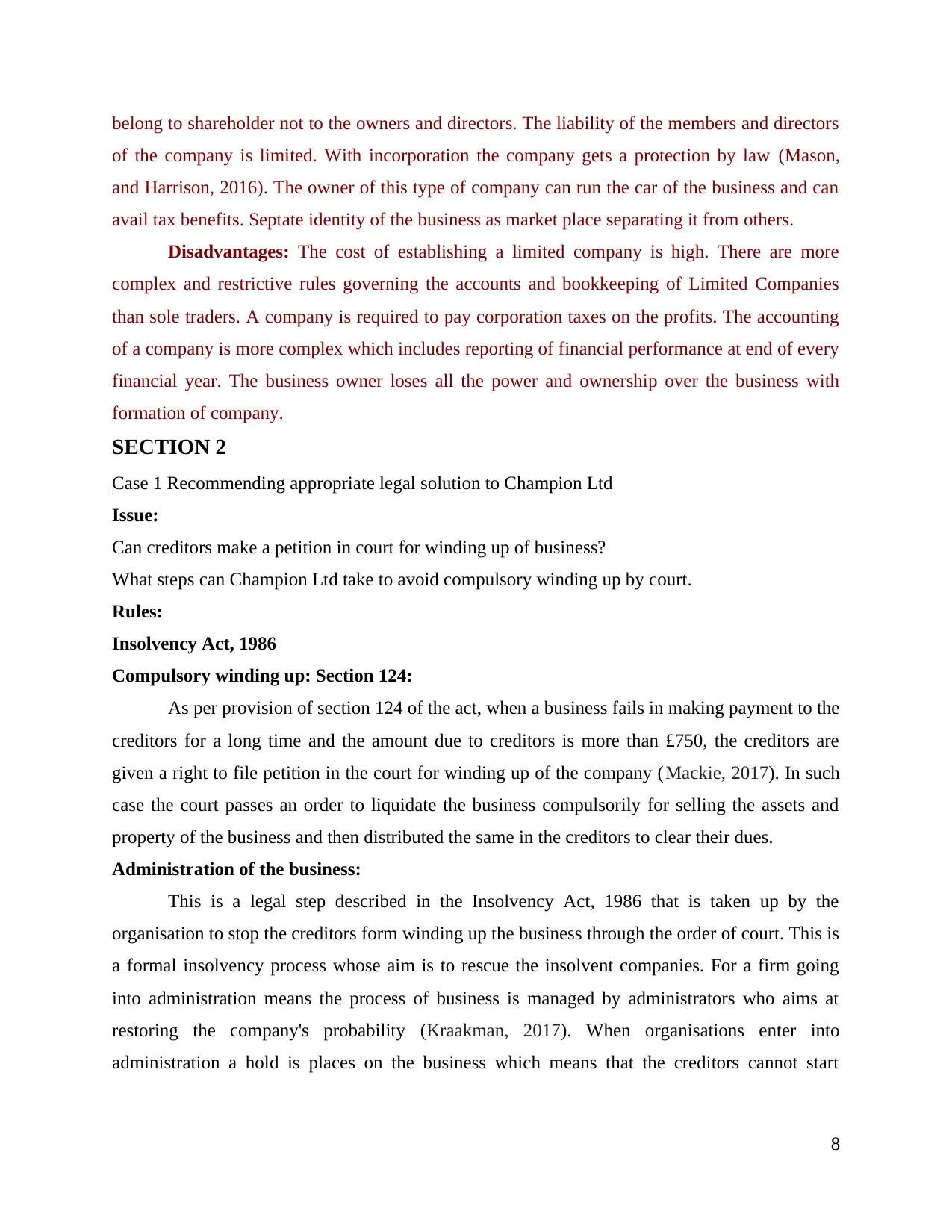
belong to shareholder not to the owners and directors. The liability of the members and directors
of the company is limited. With incorporation the company gets a protection by law (Mason,
and Harrison, 2016). The owner of this type of company can run the car of the business and can
avail tax benefits. Septate identity of the business as market place separating it from others.
Disadvantages: The cost of establishing a limited company is high. There are more
complex and restrictive rules governing the accounts and bookkeeping of Limited Companies
than sole traders. A company is required to pay corporation taxes on the profits. The accounting
of a company is more complex which includes reporting of financial performance at end of every
financial year. The business owner loses all the power and ownership over the business with
formation of company.
SECTION 2
Case 1 Recommending appropriate legal solution to Champion Ltd
Issue:
Can creditors make a petition in court for winding up of business?
What steps can Champion Ltd take to avoid compulsory winding up by court.
Rules:
Insolvency Act, 1986
Compulsory winding up: Section 124:
As per provision of section 124 of the act, when a business fails in making payment to the
creditors for a long time and the amount due to creditors is more than £750, the creditors are
given a right to file petition in the court for winding up of the company (Mackie, 2017). In such
case the court passes an order to liquidate the business compulsorily for selling the assets and
property of the business and then distributed the same in the creditors to clear their dues.
Administration of the business:
This is a legal step described in the Insolvency Act, 1986 that is taken up by the
organisation to stop the creditors form winding up the business through the order of court. This is
a formal insolvency process whose aim is to rescue the insolvent companies. For a firm going
into administration means the process of business is managed by administrators who aims at
restoring the company's probability (Kraakman, 2017). When organisations enter into
administration a hold is places on the business which means that the creditors cannot start
8
of the company is limited. With incorporation the company gets a protection by law (Mason,
and Harrison, 2016). The owner of this type of company can run the car of the business and can
avail tax benefits. Septate identity of the business as market place separating it from others.
Disadvantages: The cost of establishing a limited company is high. There are more
complex and restrictive rules governing the accounts and bookkeeping of Limited Companies
than sole traders. A company is required to pay corporation taxes on the profits. The accounting
of a company is more complex which includes reporting of financial performance at end of every
financial year. The business owner loses all the power and ownership over the business with
formation of company.
SECTION 2
Case 1 Recommending appropriate legal solution to Champion Ltd
Issue:
Can creditors make a petition in court for winding up of business?
What steps can Champion Ltd take to avoid compulsory winding up by court.
Rules:
Insolvency Act, 1986
Compulsory winding up: Section 124:
As per provision of section 124 of the act, when a business fails in making payment to the
creditors for a long time and the amount due to creditors is more than £750, the creditors are
given a right to file petition in the court for winding up of the company (Mackie, 2017). In such
case the court passes an order to liquidate the business compulsorily for selling the assets and
property of the business and then distributed the same in the creditors to clear their dues.
Administration of the business:
This is a legal step described in the Insolvency Act, 1986 that is taken up by the
organisation to stop the creditors form winding up the business through the order of court. This is
a formal insolvency process whose aim is to rescue the insolvent companies. For a firm going
into administration means the process of business is managed by administrators who aims at
restoring the company's probability (Kraakman, 2017). When organisations enter into
administration a hold is places on the business which means that the creditors cannot start
8
Paraphrase This Document
Need a fresh take? Get an instant paraphrase of this document with our AI Paraphraser
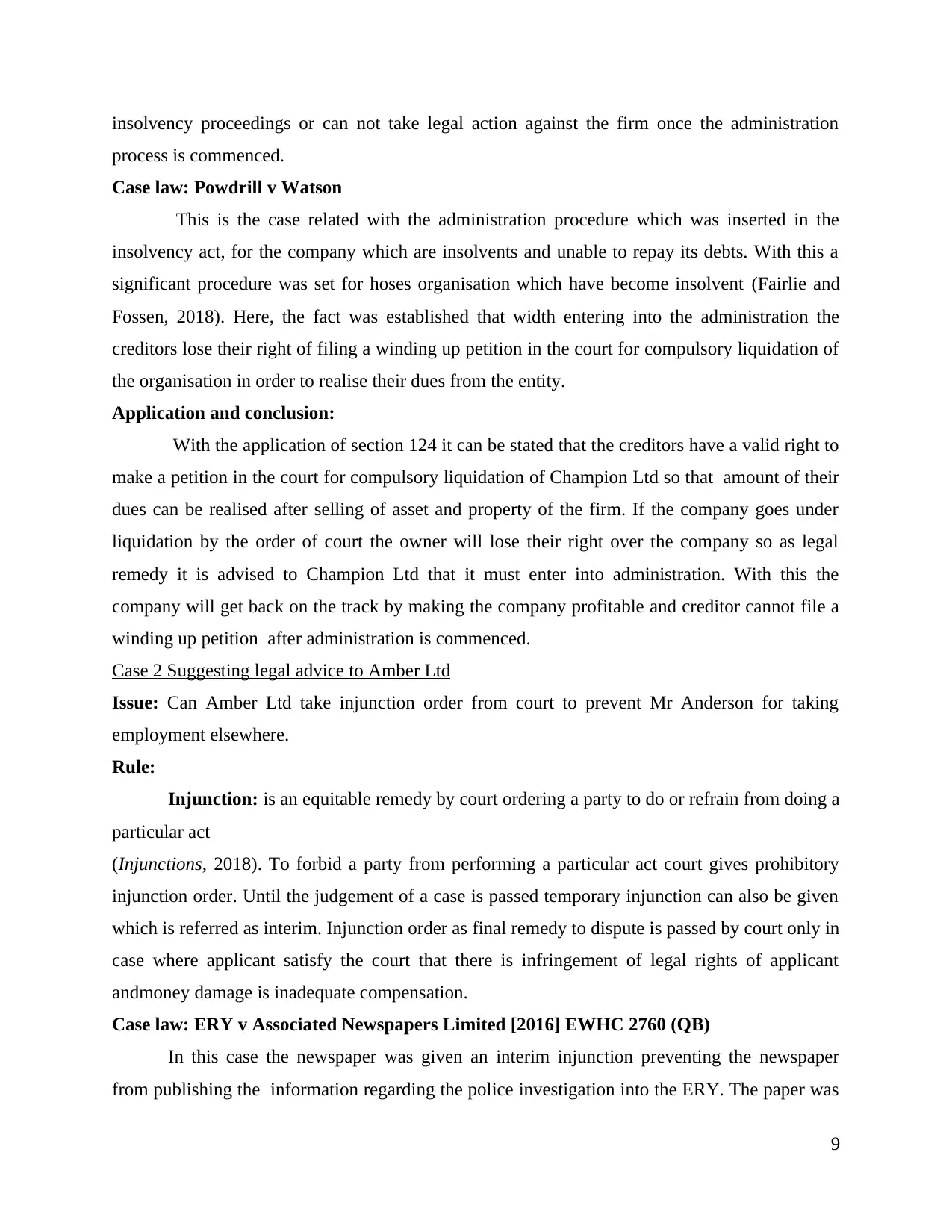
insolvency proceedings or can not take legal action against the firm once the administration
process is commenced.
Case law: Powdrill v Watson
This is the case related with the administration procedure which was inserted in the
insolvency act, for the company which are insolvents and unable to repay its debts. With this a
significant procedure was set for hoses organisation which have become insolvent (Fairlie and
Fossen, 2018). Here, the fact was established that width entering into the administration the
creditors lose their right of filing a winding up petition in the court for compulsory liquidation of
the organisation in order to realise their dues from the entity.
Application and conclusion:
With the application of section 124 it can be stated that the creditors have a valid right to
make a petition in the court for compulsory liquidation of Champion Ltd so that amount of their
dues can be realised after selling of asset and property of the firm. If the company goes under
liquidation by the order of court the owner will lose their right over the company so as legal
remedy it is advised to Champion Ltd that it must enter into administration. With this the
company will get back on the track by making the company profitable and creditor cannot file a
winding up petition after administration is commenced.
Case 2 Suggesting legal advice to Amber Ltd
Issue: Can Amber Ltd take injunction order from court to prevent Mr Anderson for taking
employment elsewhere.
Rule:
Injunction: is an equitable remedy by court ordering a party to do or refrain from doing a
particular act
(Injunctions, 2018). To forbid a party from performing a particular act court gives prohibitory
injunction order. Until the judgement of a case is passed temporary injunction can also be given
which is referred as interim. Injunction order as final remedy to dispute is passed by court only in
case where applicant satisfy the court that there is infringement of legal rights of applicant
andmoney damage is inadequate compensation.
Case law: ERY v Associated Newspapers Limited [2016] EWHC 2760 (QB)
In this case the newspaper was given an interim injunction preventing the newspaper
from publishing the information regarding the police investigation into the ERY. The paper was
9
process is commenced.
Case law: Powdrill v Watson
This is the case related with the administration procedure which was inserted in the
insolvency act, for the company which are insolvents and unable to repay its debts. With this a
significant procedure was set for hoses organisation which have become insolvent (Fairlie and
Fossen, 2018). Here, the fact was established that width entering into the administration the
creditors lose their right of filing a winding up petition in the court for compulsory liquidation of
the organisation in order to realise their dues from the entity.
Application and conclusion:
With the application of section 124 it can be stated that the creditors have a valid right to
make a petition in the court for compulsory liquidation of Champion Ltd so that amount of their
dues can be realised after selling of asset and property of the firm. If the company goes under
liquidation by the order of court the owner will lose their right over the company so as legal
remedy it is advised to Champion Ltd that it must enter into administration. With this the
company will get back on the track by making the company profitable and creditor cannot file a
winding up petition after administration is commenced.
Case 2 Suggesting legal advice to Amber Ltd
Issue: Can Amber Ltd take injunction order from court to prevent Mr Anderson for taking
employment elsewhere.
Rule:
Injunction: is an equitable remedy by court ordering a party to do or refrain from doing a
particular act
(Injunctions, 2018). To forbid a party from performing a particular act court gives prohibitory
injunction order. Until the judgement of a case is passed temporary injunction can also be given
which is referred as interim. Injunction order as final remedy to dispute is passed by court only in
case where applicant satisfy the court that there is infringement of legal rights of applicant
andmoney damage is inadequate compensation.
Case law: ERY v Associated Newspapers Limited [2016] EWHC 2760 (QB)
In this case the newspaper was given an interim injunction preventing the newspaper
from publishing the information regarding the police investigation into the ERY. The paper was
9
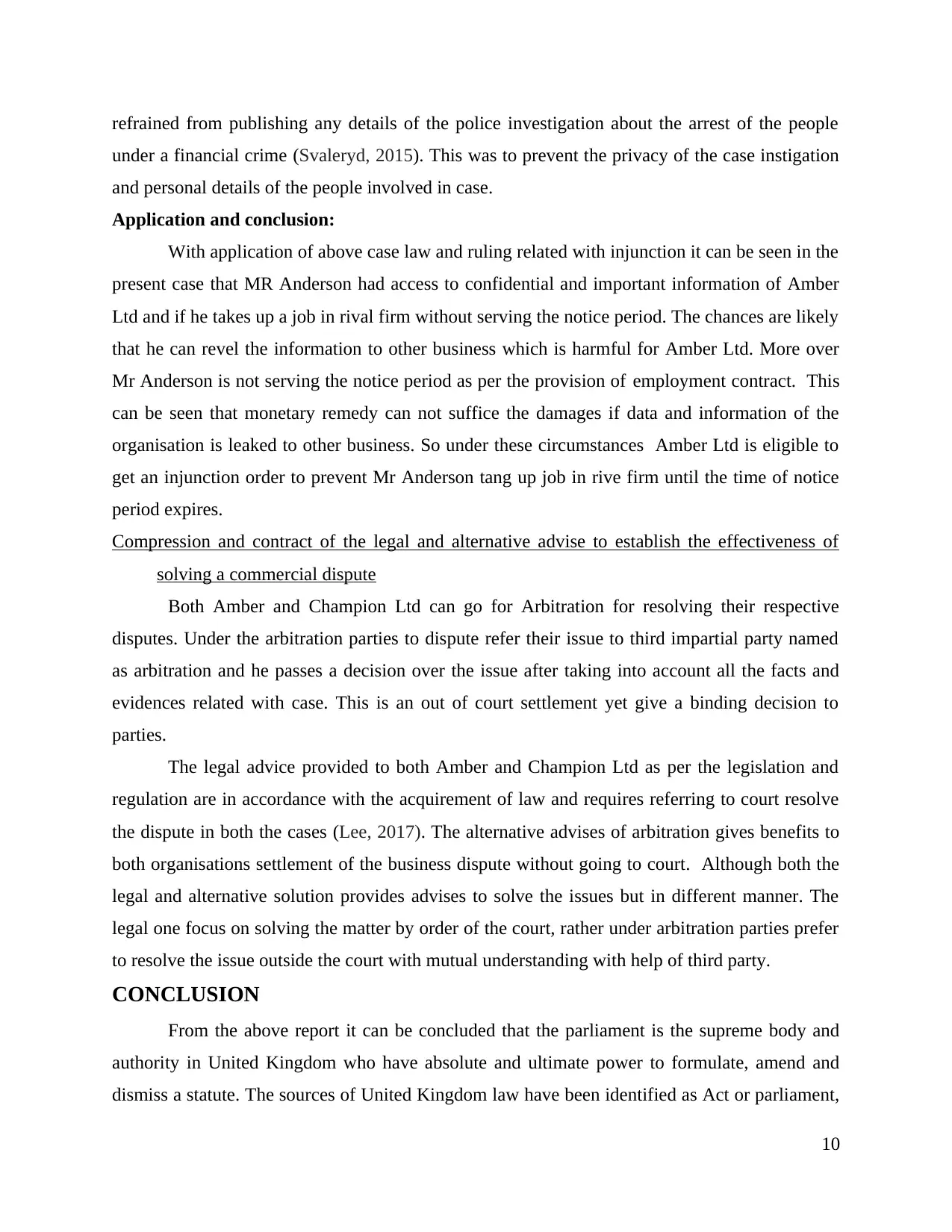
refrained from publishing any details of the police investigation about the arrest of the people
under a financial crime (Svaleryd, 2015). This was to prevent the privacy of the case instigation
and personal details of the people involved in case.
Application and conclusion:
With application of above case law and ruling related with injunction it can be seen in the
present case that MR Anderson had access to confidential and important information of Amber
Ltd and if he takes up a job in rival firm without serving the notice period. The chances are likely
that he can revel the information to other business which is harmful for Amber Ltd. More over
Mr Anderson is not serving the notice period as per the provision of employment contract. This
can be seen that monetary remedy can not suffice the damages if data and information of the
organisation is leaked to other business. So under these circumstances Amber Ltd is eligible to
get an injunction order to prevent Mr Anderson tang up job in rive firm until the time of notice
period expires.
Compression and contract of the legal and alternative advise to establish the effectiveness of
solving a commercial dispute
Both Amber and Champion Ltd can go for Arbitration for resolving their respective
disputes. Under the arbitration parties to dispute refer their issue to third impartial party named
as arbitration and he passes a decision over the issue after taking into account all the facts and
evidences related with case. This is an out of court settlement yet give a binding decision to
parties.
The legal advice provided to both Amber and Champion Ltd as per the legislation and
regulation are in accordance with the acquirement of law and requires referring to court resolve
the dispute in both the cases (Lee, 2017). The alternative advises of arbitration gives benefits to
both organisations settlement of the business dispute without going to court. Although both the
legal and alternative solution provides advises to solve the issues but in different manner. The
legal one focus on solving the matter by order of the court, rather under arbitration parties prefer
to resolve the issue outside the court with mutual understanding with help of third party.
CONCLUSION
From the above report it can be concluded that the parliament is the supreme body and
authority in United Kingdom who have absolute and ultimate power to formulate, amend and
dismiss a statute. The sources of United Kingdom law have been identified as Act or parliament,
10
under a financial crime (Svaleryd, 2015). This was to prevent the privacy of the case instigation
and personal details of the people involved in case.
Application and conclusion:
With application of above case law and ruling related with injunction it can be seen in the
present case that MR Anderson had access to confidential and important information of Amber
Ltd and if he takes up a job in rival firm without serving the notice period. The chances are likely
that he can revel the information to other business which is harmful for Amber Ltd. More over
Mr Anderson is not serving the notice period as per the provision of employment contract. This
can be seen that monetary remedy can not suffice the damages if data and information of the
organisation is leaked to other business. So under these circumstances Amber Ltd is eligible to
get an injunction order to prevent Mr Anderson tang up job in rive firm until the time of notice
period expires.
Compression and contract of the legal and alternative advise to establish the effectiveness of
solving a commercial dispute
Both Amber and Champion Ltd can go for Arbitration for resolving their respective
disputes. Under the arbitration parties to dispute refer their issue to third impartial party named
as arbitration and he passes a decision over the issue after taking into account all the facts and
evidences related with case. This is an out of court settlement yet give a binding decision to
parties.
The legal advice provided to both Amber and Champion Ltd as per the legislation and
regulation are in accordance with the acquirement of law and requires referring to court resolve
the dispute in both the cases (Lee, 2017). The alternative advises of arbitration gives benefits to
both organisations settlement of the business dispute without going to court. Although both the
legal and alternative solution provides advises to solve the issues but in different manner. The
legal one focus on solving the matter by order of the court, rather under arbitration parties prefer
to resolve the issue outside the court with mutual understanding with help of third party.
CONCLUSION
From the above report it can be concluded that the parliament is the supreme body and
authority in United Kingdom who have absolute and ultimate power to formulate, amend and
dismiss a statute. The sources of United Kingdom law have been identified as Act or parliament,
10
⊘ This is a preview!⊘
Do you want full access?
Subscribe today to unlock all pages.

Trusted by 1+ million students worldwide
1 out of 15
Related Documents
Your All-in-One AI-Powered Toolkit for Academic Success.
+13062052269
info@desklib.com
Available 24*7 on WhatsApp / Email
![[object Object]](/_next/static/media/star-bottom.7253800d.svg)
Unlock your academic potential
Copyright © 2020–2026 A2Z Services. All Rights Reserved. Developed and managed by ZUCOL.





